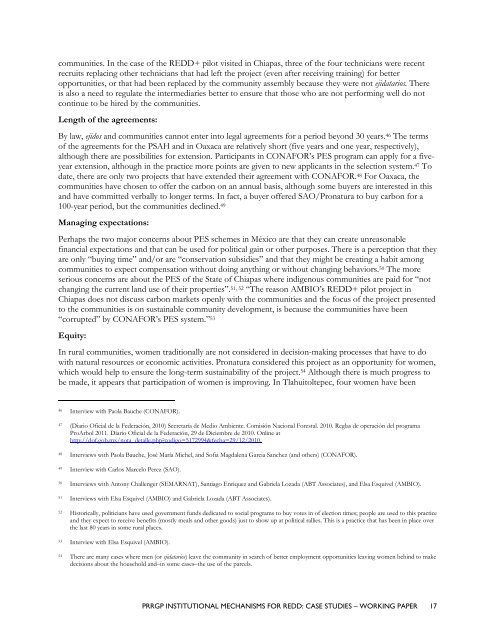Institutional Mechanisms for REDD+ - Case Studies Working Paper
Institutional Mechanisms for REDD+ - Case Studies Working Paper
Institutional Mechanisms for REDD+ - Case Studies Working Paper
Create successful ePaper yourself
Turn your PDF publications into a flip-book with our unique Google optimized e-Paper software.
communities. In the case of the <strong>REDD+</strong> pilot visited in Chiapas, three of the four technicians were recent<br />
recruits replacing other technicians that had left the project (even after receiving training) <strong>for</strong> better<br />
opportunities, or that had been replaced by the community assembly because they were not ejidatarios. There<br />
is also a need to regulate the intermediaries better to ensure that those who are not per<strong>for</strong>ming well do not<br />
continue to be hired by the communities.<br />
Length of the agreements:<br />
By law, ejidos and communities cannot enter into legal agreements <strong>for</strong> a period beyond 30 years. 46 The terms<br />
of the agreements <strong>for</strong> the PSAH and in Oaxaca are relatively short (five years and one year, respectively),<br />
although there are possibilities <strong>for</strong> extension. Participants in CONAFOR‘s PES program can apply <strong>for</strong> a fiveyear<br />
extension, although in the practice more points are given to new applicants in the selection system. 47 To<br />
date, there are only two projects that have extended their agreement with CONAFOR. 48 For Oaxaca, the<br />
communities have chosen to offer the carbon on an annual basis, although some buyers are interested in this<br />
and have committed verbally to longer terms. In fact, a buyer offered SAO/Pronatura to buy carbon <strong>for</strong> a<br />
100-year period, but the communities declined. 49<br />
Managing expectations:<br />
Perhaps the two major concerns about PES schemes in México are that they can create unreasonable<br />
financial expectations and that can be used <strong>for</strong> political gain or other purposes. There is a perception that they<br />
are only ―buying time‖ and/or are ―conservation subsidies‖ and that they might be creating a habit among<br />
communities to expect compensation without doing anything or without changing behaviors. 50 The more<br />
serious concerns are about the PES of the State of Chiapas where indigenous communities are paid <strong>for</strong> ―not<br />
changing the current land use of their properties‖. 51, 52 ―The reason AMBIO‘s <strong>REDD+</strong> pilot project in<br />
Chiapas does not discuss carbon markets openly with the communities and the focus of the project presented<br />
to the communities is on sustainable community development, is because the communities have been<br />
―corrupted‖ by CONAFOR‘s PES system.‖ 53<br />
Equity:<br />
In rural communities, women traditionally are not considered in decision-making processes that have to do<br />
with natural resources or economic activities. Pronatura considered this project as an opportunity <strong>for</strong> women,<br />
which would help to ensure the long-term sustainability of the project. 54 Although there is much progress to<br />
be made, it appears that participation of women is improving. In Tlahuitoltepec, four women have been<br />
46 Interview with Paola Bauche (CONAFOR).<br />
47 (Diario Oficial de la Federación, 2010) Secretaría de Medio Ambiente. Comisión Nacional Forestal. 2010. Reglas de operación del programa<br />
ProArbol 2011. Diario Oficial de la Federación, 29 de Diciembre de 2010. Online at<br />
http://dof.gob.mx/nota_detalle.php?codigo=5172994&fecha=29/12/2010.<br />
48 Interviews with Paola Bauche, José María Michel, and Sofia Magdalena Garcia Sanchez (and others) (CONAFOR).<br />
49 Interview with Carlos Marcelo Perez (SAO).<br />
50 Interviews with Antony Challenger (SEMARNAT), Santiago Enriquez and Gabriela Lozada (ABT Associates), and Elsa Esquivel (AMBIO).<br />
51 Interviews with Elsa Esquivel (AMBIO) and Gabriela Lozada (ABT Associates).<br />
52 Historically, politicians have used government funds dedicated to social programs to buy votes in of election times; people are used to this practice<br />
and they expect to receive benefits (mostly meals and other goods) just to show up at political rallies. This is a practice that has been in place over<br />
the last 80 years in some rural places.<br />
53 Interview with Elsa Esquivel (AMBIO).<br />
54 There are many cases where men (or ejidatarios) leave the community in search of better employment opportunities leaving women behind to make<br />
decisions about the household and–in some cases–the use of the parcels.<br />
PRRGP INSTITUTIONAL MECHANISMS FOR REDD: CASE STUDIES – WORKING PAPER 17

















